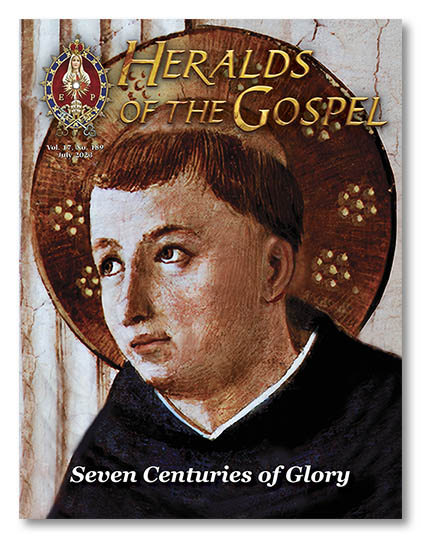Few historical personages have deserved the title the Great. Alexander received it for his military conquests and the expansion of the Macedonian Empire. Charlemagne, also called the father of Europe, was great because a new civilization was born of him and his Holy Roman-Germanic Empire. Others tried to so denominate themselves, like Napoleon Bonaparte, but without success… The Church, in turn, has bestowed this significant appellation on a small number of Saints, including St. Basil, St. Leo and St. Gregory.
Thomas Aquinas has been honoured with innumerable predicates. However, he could first of all be called Magnus, that is, theGreat.
Great was his predestination, since from his gestation, according to the biographer William of Tocco, his mother received revelations about the exceptional vocation of her son.
His contemplative spirit was equally great. While still a small boy at the Monastery of Monte Cassino, he insistently questioned the monks, “Who is God?” There, the entire theological cathedral of his doctrine was already present in germ.
Great was his purity, for he practised the angelic virtue in a heroic way, this being the facet of his soul that most distinguished him in the testimonies for his canonization. As Pius XI pointed out, had he not been angelic in virtue, he would also not have been a doctor. Shortly before Thomas’ death, his confessor reported that his faults were similar to those of an innocent child.
Even his bodily proportions were great, but even more so those of his soul, for he excelled in magnanimity, the virtue that makes the spirit tend towards greatness, as he himself explained.
Great, moreover, was his discipline in studies, whose master could only be a great Saint named Albert. He wrote over a hundred works, most of them commissioned by the most varied interlocutors, from Popes, kings and nobles to colleagues and confreres.
A great professor at the University of Paris, his highly attended lectures attracted not only the attention of students, but also the envious eye of his peers. Thus, the disputes with his opponents were also numerous. Nevertheless, the truth always fought in his favour.
A great poet of the Eucharist, he composed wonderful hymns to the Blessed Sacrament, such as Adoro te devote, which continue to inspire Catholic piety to this day.
His miracles were also great, causing John XXII to comment about him: “He wrote as many articles as he performed miracles.”
Great, finally, were the honours he accrued, to the point of Benedict XV affirming that Holy Church has assumed as her own the doctrine of Aquinas.
We could go on enumerating the great qualities of the Angel of the Schools, many of which are illustrated in the pages of this edition. We insist, however, on attributing to him the title of Magnus, and it is hoped that the Church will do so in the future because, unlike the Alexanders and Napoleons, the Angelic Doctor’s magnificence crosses centuries of history and lives on in our days.
This is because Thomas Aquinas did not seek the vainglory of the Caesars or accept the blinding incense of flatterers, but was crowned with the greatest of glories: that of sanctity, whose recognition by the Church through canonization occurred on July 18, 1323, exactly seven hundred years ago. Thus was opened to him the luminous path of the authentic greats. ◊



